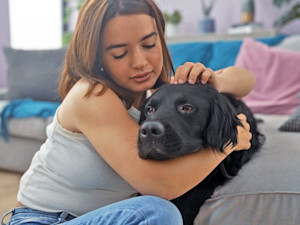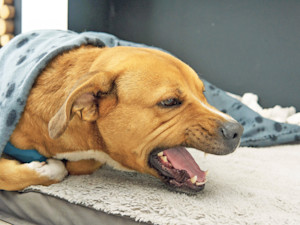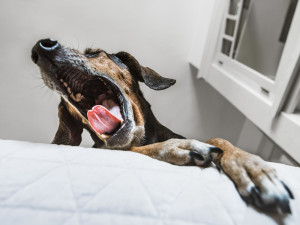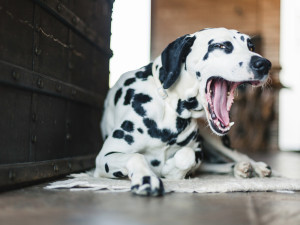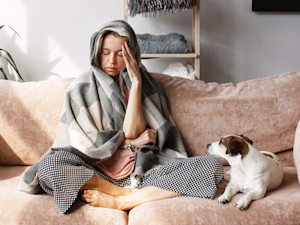What to Do If You Think Your Puppy Has Kennel Cough
Symptoms to look out for.

Share Article
In This Article:
What is Kennel Cough in Puppies? Signs of Kennel Cough in Puppies What to Do If You Suspect Kennel Cough in Your Puppy How to Treat Kennel Cough in Puppies Home Treatments for Kennel Cough in Puppies
Is your puppy showing signs of kennel cough? Learn the symptoms, treatment options, and essential steps to take if you suspect your puppy has this condition.
What is kennel cough in puppies?
Kennel cough is an infectious upper respiratory disease that causes a persistent cough in dogs and puppies. It is highly contagious and can spread easily in environments where multiple dogs are in close contact, like puppy kindergarten, play dates, dog parks, boarding facilities, and animal shelters.
Kennel cough is transmitted through direct contact when an infected dog coughs or sneezes near another dog or indirectly via contact with contaminated objects and surfaces. Items like toys, food bowls, bedding, and even walls can harbor the pathogens responsible for kennel cough.

Puppies are especially vulnerable to this condition due to their immature immune systems and frequent exposure to other dogs in communal settings. Those from shelters or other multi-dog environments are at an even higher risk of contracting the disease.
What causes kennel cough in puppies?
Kennel cough is the common name for Canine Infectious Respiratory Disease Complex (CIRDC). Part of why it’s called a “complex” is because there are multiple possible infectious agents that can cause the disease. CIRDC in puppies is caused by one or more bacterial or viral pathogens.
Vaccines are available to help protect puppies against some of the organisms responsible for the disease. The core vaccine series for puppies protects against some common causes, like the canine parainfluenza virus. Other pathogens require separate vaccines to reduce a puppy's risk of infection.
Common bacteria and viruses responsible for canine infectious respiratory disease complex (CIRD) include:
Bordetella bronchiseptica
Mycoplasma species
Streptococcus equis subspecies zooepidemicus
Canine parainfluenza virus
Canine adenovirus type 2
Canine influenza virus (subtypes H3N2 and H3N8)
Canine respiratory coronavirus
Canine herpesvirus-1
Canine distemper virus
How long does kennel cough last in puppies?
The incubation period for kennel cough is typically two to three days but can be up to 10 days, depending on the pathogen. This means that a puppy can be infected with (and spreading) CIRDC for several days before they start showing any symptoms. Once signs develop, a puppy’s kennel cough symptoms typically resolve within around ten days.
How dangerous is kennel cough to my puppy?
Puppies are at a higher risk of complications from CIRDC due to their immature immune systems and incomplete vaccination series. These complications can include fever, loss of appetite, and, in severe cases, progression to pneumonia and breathing difficulties.
Antibiotics for kennel cough in puppies are typically not warranted, but they may be prescribed in certain cases. Doxycycline is a commonly used first-line antibiotic for kennel cough; however, it can have side effects in puppies, such as tooth discoloration and potential changes in bone growth. Fortunately, there are alternative antibiotics that are safer for puppies, if needed.
Signs of kennel cough in puppies
For puppy parents wondering, “What does kennel cough sound like in puppies?”, it typically presents as a harsh, dry, hacking cough. Most puppies with Canine Infectious Respiratory Disease Complex have normal energy levels and appetites, with symptoms primarily limited to upper respiratory signs. However, some puppies may become lethargic and exhibit signs of systemic illness.
Signs of CIRDC in puppies include:
Dry, hacking cough
Gagging or retching at the end of coughing fits
Nasal discharge
Eye discharge
Lethargy
Decreased appetite
Fever
What to do if you suspect kennel cough in your puppy
You’re a responsible puppy parent who wants a well-socialized puppy, so you enrolled them in puppy kindergarten. It’s going great. They now know basic commands and are enthusiastic about playing with other dogs. But one day during play time, your puppy has a soft cough. Now it’s bedtime and your puppy is hacking and gagging every twenty minutes. Crap. Here’s what to do if you think your puppy has kennel cough.
Isolate your puppy
If your puppy has kennel cough, they were likely contagious well before they developed symptoms. But once they develop symptoms, it’s best to assume they are contagious. Don’t allow your puppy to have direct contact with other dogs. This means no doggy daycare, no puppy kindergarten, no dog parks, no pet stores, no groomers. Because other dogs can pick up the disease from objects that were coughed or sneezed on, don’t allow your puppy to visit any places where other dogs are likely to be later, like an empty dog park.
Monitor symptoms
Keep an eye on your dog’s symptoms and monitor for any worsening. Coughing, sneezing, and maybe a few puppy boogers are to be expected. But you should seek veterinary care if your puppy starts to have:
A fever
Decreased appetite
Vomiting
Depression
Breathing changes
Contact your veterinarian
It’s always a good idea to seek veterinary advice if you think your puppy has kennel cough. Be sure to call the veterinary clinic before taking your puppy in so that the staff knows they will be seeing a potentially contagious patient. There are precautions that staff members can take to prevent the spread of CIRDC, parvovirus, or other contagious diseases. So, help keep all the pups in your community safe by giving them a heads up.
CIRDC is typically diagnosed by medical history and thorough physical exam alone, but if your vet is concerned that your pup may be having complications or wants to rule out other illnesses, they may recommend diagnostic tests like blood work, radiographs (X-rays).
Inform your pup’s social spaces
If your puppy has recently visited a daycare, groomer, or boarding facility, inform them of your dog’s diagnosis. This allows them to perform a deep cleaning of their facilities and inform other dog parents to be on the lookout for symptoms in their own pups.
How to treat kennel cough in puppies
Treatment for CIRDC depends on the severity of the disease. Many puppies will recover from a bout of kennel cough with time and rest. Other puppies may benefit from being prescribed a cough suppressant by their vet. In severe cases, antibiotics may be recommended if there is concern that a puppy is developing pneumonia or systemic illness.
Puppies with cases of CIRDC that progress to pneumonia may require hospitalization for oxygen supplementation, fluid therapy, injectable medications, and close monitoring.
Home treatments for kennel cough in puppies
Give medications as directed
If your vet prescribes medications, give them as directed. If your puppy was prescribed antibiotics, be sure to give the full course, even if they are feeling better before they’re done. If your puppy doesn’t seem to be improving, talk to your veterinarian. Don’t reach for OTC human medications.
Let your puppy rest
Let your puppy rest and recuperate. A chill environment with minimal stress will give their immune system time to fight the infection and allow your puppy to have some much-needed down time.
Use a harness
Kennel cough causes the trachea to become irritated, and any pressure can put a puppy into a coughing fit. Use a harness instead of a neck lead to minimize pressure on their airway.
Clean everything
Be sure to thoroughly clean all of your puppies belongings during treatment and after they’re fully recovered. This includes toys, bedding, leashes, and food and water dishes. If you frequent pet stores or other dog-friendly spaces, be sure to wear clean clothing and wash your hands before petting other dogs outside of your home.
Keep your puppy isolated
Keep your puppy isolated from other dogs until they’re fully recovered. We generally recommend no interactions with other dogs or dog-friendly spaces until your puppy has been symptom-free for ten to fourteen days. That means a lot of at-home snuggle time while your pup recovers.
References
“Canine Infectious Respiratory Disease Complex (Kennel Cough).” American Veterinary Medical Association, www.avma.org/resources-tools/pet-owners/petcare/canine-infectious-respiratory-disease-complex-kennel-coughopens in new tab.
Reagan, Krystle L., and Jane E. Sykes. “Canine Infectious Respiratory Disease.” Veterinary Clinics of North America: Small Animal Practice, vol. 50, no. 2, 1 Mar. 2020, pp. 405–418, www.sciencedirect.com/science/article/pii/S0195561619301676?via%3Dihub#tbl1, https://doi.org/10.1016/j.cvsm.2019.10.009opens in new tab.
Tonozzi, Caroline. “Kennel Cough - Respiratory System.” MSD Veterinary Manual, Feb. 2022, www.msdvetmanual.com/respiratory-system/respiratory-diseases-of-small-animals/kennel-coughopens in new tab.

Dr. Alycia Washington, DVM, MS
Alycia Washington is a small-animal emergency veterinarian with over 10 years of experience based in North Carolina. She works as a relief veterinarianopens in new tab and provides services to numerous emergency and specialty hospitals. She also works as a veterinary writer with a focus on educating pet parents.
Related articles
Can Cats Get Kennel Cough From Dogs?
The answer isn’t fun, but you can prevent this.
![A dog coughing]()
Is Kennel Cough Contagious?
What you need to know about this super contagious disease. (Hint: There’s a vaccine.)
![Large brown dog sick and coughing.]()
Why Is My Dog Coughing? 11 Reasons Why and What to Do
From toxins to allergies, let’s get down to business and problem-solve this.
![Beautiful dalmatian dog breed coughing at home.]()
Canine Respiratory Illnesses Are Spreading Across the U.S.
What we know and what dog parents should look out for.
![]()
Can Dogs Get the Flu from Humans?
Or is it OK to snuggle them close while we recover?
